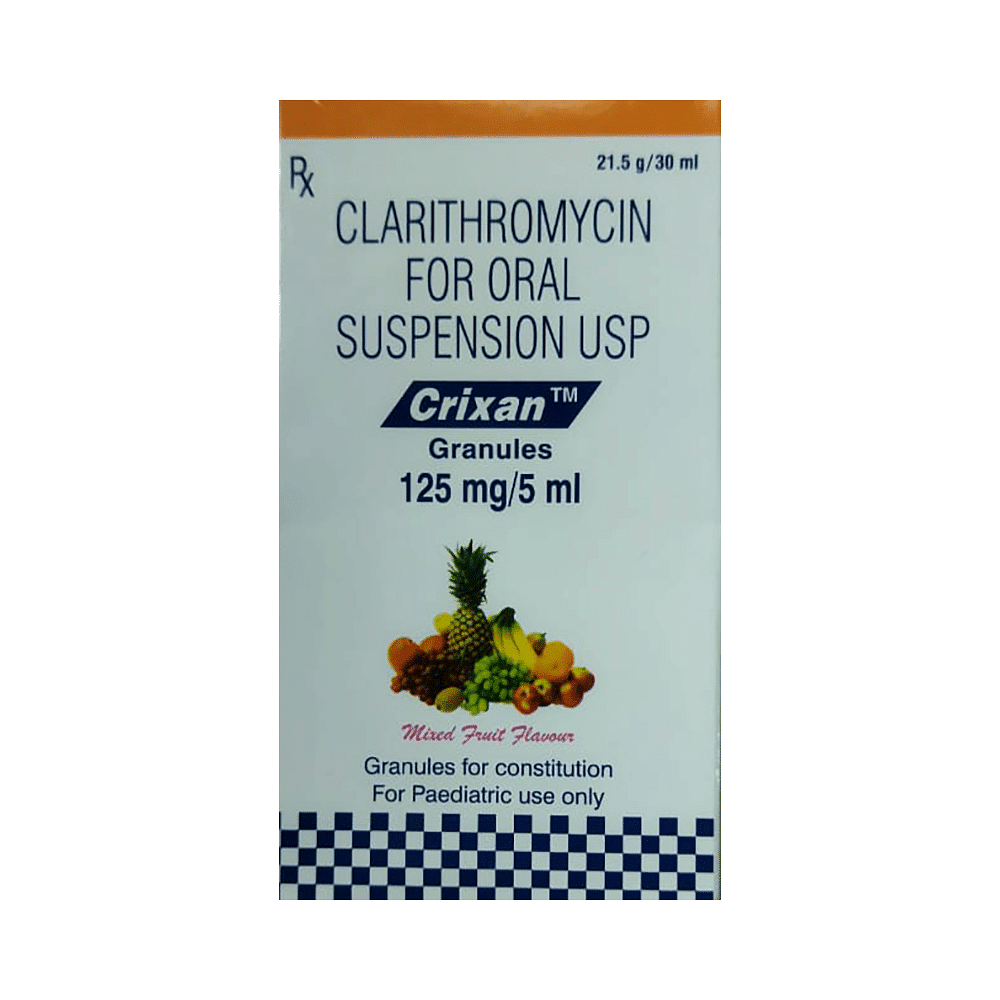
Claron Oral Suspension
Manufacturer
Agex Laboratories Pvt Ltd
Salt Composition
Clarithromycin (125mg/5ml)
Key Information
Short Description
Claron Oral Suspension is an antibiotic medication used to treat a wide range of bacterial infections in children.
Dosage Form
Oral Suspension
Introduction
Claron Oral Suspension is an antibiotic medication given to children to treat a wide range of bacterial infections targeting the ear, throat, teeth, lungs, heart, skin, and gastrointestinal tract. It also helps treat bacterial infections that can occur in children with HIV due to their weak immune systems.
Directions for Use
Your child must complete the entire course of this medicine. Stopping the medicine without completing the dose can bring back the infection or make the bacteria resistant.
Safety Information
Side Effects
No common side effects listed
Interacting Medicines
Astemizole Disopyramide Ebastine Lovastatin
How it works
Claron Oral Suspension is an antibiotic that works by stopping the bacteria from utilizing proteins that are necessary for the bacteria to survive and perform important functions. It stops the infection-causing bacteria from growing further and prevents the infection from spreading.
Quick Tips
Your child must complete the entire course of this medicine Encourage your child to drink plenty of water in case diarrhea develops as a side effect Do not give Claron Oral Suspension to your child for cold & flu until and unless advised by the doctor Only give Claron Oral Suspension to your child for their current infection Stop the medicine and contact the doctor immediately if your child develops an itchy rash, facial swelling, and breathing difficulties soon after the intake
Related Medicines

Claribid 125mg Syrup

Synclar 125 MG Dry Syrup Banana

Crixan 125mg Granules Suspension Mixed Fruit

Eclarin Dry Syrup

Laritova Dry Syrup

Calljoy 125mg Oral Suspension

Clarithral 125 Oral Suspension

Claridac 125mg/5ml Oral Suspension

Ediclar 125mg Oral Suspension

Cloff XL Dry Syrup
Frequently asked questions
What is the appropriate dosage of Claron Oral Suspension for my child?
The prescribed dose of Claron Oral Suspension will be determined by your physician based on the type and severity of infection, as well as your child's age and weight. Self-adjusting dosages may lead to adverse reactions or inefficacy. Adhering to the prescribed dosage, timing, and method is crucial. This approach can generally promote improvement within a few regular doses. However, ensure complete course completion without abruptly stopping medication to avoid reinfection. Abruptly ceasing treatment could allow bacteria to develop resistance to Claron Oral Suspension.
What should I do if my child accidentally takes an overdose of Claron Oral Suspension?
Overdosing on Claron Oral Suspension is unlikely to cause significant harm, but it's crucial to exercise caution as potential side effects could occur. Consulting a doctor immediately after considering a possible overdose is recommended to ensure prompt and appropriate medical intervention.
Are there any serious risks associated with Claron Oral Suspension use?
Potential serious side effects of this medication include abnormal heart conduction (QT prolongation), allergic reactions, diarrhea, and severe gastrointestinal infections (superinfections). It's vital to contact your child's physician if they experience these symptoms during or after treatment.
Can I administer other medications alongside Claron Oral Suspension at the same time?
Claron Oral Suspension might interact with other medications. It's important to inform your child's doctor about all existing medications before starting Claron Oral Suspension. Consulting a healthcare professional regarding any potential medication interactions or side effects is advisable.
Can I give my child the vaccine while on Claron Oral Suspension treatment?
Antibiotics typically don't interfere with vaccines, and they generally don't cause negative reactions in children who have recently received a vaccination. However, it is generally advised to hold off on administering any vaccines until after your child has fully recovered from the illness. If your child feels better, the vaccine can be administered once the fever subsides.
Are there specific lab tests necessary while using Claron Oral Suspension long term?
The doctor may recommend periodic checks for kidney function tests, liver function tests, and baseline electrocardiograms (ECG) as part of a comprehensive assessment during prolonged treatment.
Can Claron Oral Suspension affect my child’s digestion?
Children's digestive systems can be sensitive, potentially leading to stomach upset while on medication. Moreover, antibiotics might eliminate good bacteria alongside harmful bacteria in the digestive system, increasing the risk of gastrointestinal problems during and after treatment. If your child experiences diarrhea while on Claron Oral Suspension, do not discontinue the course of medication. Instead, contact your doctor for guidance regarding next steps. In some cases, they may adjust the dosage.
Can Claron Oral Suspension be used with children experiencing muscle weakness disorders?
Using Claron Oral Suspension should be carefully considered in children with neuromuscular disorders like Myasthenia gravis, as it may lead to worsening symptoms or even new ones.
How can bacteria develop resistance against Claron Oral Suspension?
Unnecessary use of Claron Oral Suspension can provide an opportunity for bacteria to adapt and develop mechanisms to evade the drug's effects. This phenomenon leads to decreased medication efficacy, even when necessary. While this is often termed as 'resistance', it is important to understand that it is actually resistance of the bacteria, not the medicine.


